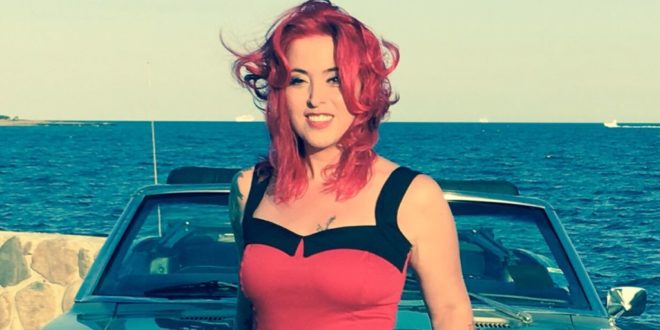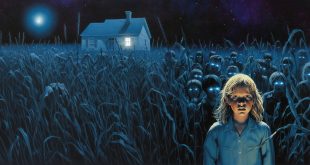Brooklyn alterna-songstress Christina Rubino has poured copious vitality, temerity, and sincerity into a near-decade strong pursuit. Back in 2008 at age 17, Rubino’s musical proclivity was fueled in part by her large, close-knit family, which includes seven siblings. “They were so crazy, that I had no choice but to become an artist to process some of that crazy,” she states.
Rubino’s professional path gained steady momentum into the following year. She began as lead guitarist for Depeche Mode tribute Violator, which earned her touring experience. She then proceeded to front as well as drop an EP with, Josephine, an original new wave offshoot featuring Violator bassist Leigh Regan and drummer Tracy Thompkins.
By the time of her solo career in 2014, Rubino welcomed a broader scope of styles. “I love Depeche Mode, I love the Cure—I love 80s music as much as anybody else, but in my solo stuff, it’s not such a big influence. Maybe you can hear a little bit in the melodies, but yeah, my scope of influences is vast,” laughs Rubino. With this change came widespread acclaim. Her debut album, Alive from the Scrap Heap, was received warmly in such publications as The Examiner, Pop Dose Magazine, and Indie Artist Alliance
Last November, Rubino released a single, “Godspeed and Guns,” to be included in her follow-up of the same name. The album’s street date is January 6th, 2017, with production duties resumed by Jerry Farley. In addition to the album, she and I discussed her present career outlook, the negative (and, to an extent, positive) aspects of gentrification, as well the importance of both immediate and chosen family.
ME: The transitional period from band to solo act lasted five years, is that right?
CR: Yeah, pretty much. I’d want to say like ’09 to ’14, so just about that. There was a little bit of a lull between that time, getting the confidence I needed back in me.
ME: Was that a matter of not only finding yourself musically but replenishing your well-being?
CR: Yes, I definitely had to replenish the well-being. Art and music kind of sometimes get tied up in other things that maybe aren’t so positive. I had to really shake all that negative stuff off, and come back clean, focused, and professional, and I did!
ME: Congratulations on that! You have great music, and you’re moving forward, so that’s what’s important.
CR: Yes, definitely. Thank you!
ME: Between Alive from the Scrap Heap and the upcoming Godspeed and Guns album, would you consider this a clean slate in a thematic sense, or expounding upon the last album?
CR: Actually, it’s a pretty clean slate. In the songs on this upcoming album, you’re going to hear more of those influences. I love all kinds of music, you know? I love punk rock, and I [also] love country and Americana. Not that there’s no difference, but you’re going to hear all of that. It’s definitely a clean slate.
I think Alive from the Scrap Heap was a lot of that emotional processing from the time I had to step away from music and get clean. That had to be put behind me so that I could step into music not necessarily from a place of pain, but from one of creativity and storytelling.
ME: Let’s talk about the single “Godspeed and Guns”. In regards to its placement on the album, does this piece together various vignettes of strife that reveal themselves with each track?
CR: With “Godspeed and Guns,” the idea for the song came so suddenly and so strong. It took maybe five minutes to write, I’m not even kidding! It just kind of poured out. Now I don’t know exactly what transpired in terms of inspiration, but it has to do with the subconscious. That definitely is a vignette for some of the themes on the album.
ME: Essentially, it’s a means of recognizing we’re at fault, and saying “Oh, man, I should have taken precautionary measures before letting this situation totally consume me”.
CR: It’s funny because the song revealed its meaning to me after I wrote it. I hear the song, get the guitar, write it out, craft it, comb out the knots, and sculpt it out. It’s really about denying what’s wrong with you. And everybody does that. We live in a blame culture. Well, not culture; it’s human nature. We stay sick like that, you know what I mean?
That whole concept is the shadow self. The shadow self that this girl has attached to her, has a very dark side. She’s just not willing to take responsibility and look at herself, so she stays sick. Stuff happens to her at a young age when she’s not dealt a good hand. But always being unwilling to look at that is going to keep somebody sick. I think that’s what the song is trying to communicate, in a major hyperbole, almost comedic way, you know (laughs)?
ME: You’d mentioned that the song is especially impactful when the album is listened to in its entirety. Does a lot of that come down to its stylistic variations, as well as the cohesiveness between tracks?
CR: Yeah, it goes from punk rock to piano ballads, to songs like “Godspeed and Guns”. Stylistically, the songs really did dictate to us what they were, instead of us trying to fit it all into a neat package. The skin may be different, but the heart throughout the album is pretty consistent.
ME: Generally throughout your solo tenure, you’ve continually picked yourself after hitting rock bottom. Can you tell me a bit about these phases, and how you’d managed to ultimately move forward?
CR: Sure. I was losing focus on art, what the point is of making music, and getting lost in substances. I got caught up a little too much in that lifestyle. That was the path I was on and it kind of ruined my life (laughs)! So I had to get sober, and really find who I was. I couldn’t really create during that time because I needed that space to connect.
So, again, I hit a total rock bottom in life, and I had to take some action, to find my strength and to find my power. And I did! I actually now have seven years clean and sober.
ME: During that dependency, were you always writing, or did that take some time to reinvigorate?
CR: It took some time, but there were songs that would torture me until I would write them. When I wrote them, I’d see that they’re too…what’s the word…’exposing’, you know? So I put them in a drawer, and I was like, “I am NEVER, EVER going to release these or play them,” because they’re just too personal. They were raw, and they were real.
Then my producer, who’s a very close friend of mine, called me a selfish bitch for not releasing them (laughs)! And he was right! Because if there are people out there who are struggling with the same things I’m struggling with, who am I to not release that music if it could help somebody? If I’m not going to make art in the spirit of love and service, then I’m making art out of ego and there’s no point to it. That’ll just bring me down the same road I went down the first time. So I released them, and I said, “You know what? Whatever (laughs).”
ME: After that period, you definitely had a moment of clarity, like, “What am I doing? I’ve got to remember my purpose. I’m out to help people. This is all I’ve set out to do.”
CR: Yes, exactly! There has to be a purpose. If I’m just self-serving by putting out music, then I should kill myself. Or just become an accountant. Not that there’s anything wrong with being an accountant, but if I’m doing this to get attention and money, then there’s really no point in being an artist.
ME: With the acclaim you’ve earned over the years, in what ways have you’ve worked to not only improve your career approach but better yourself in general?
CR: I’m also an illustrator, a painter, and a designer. Playing out is good. I’ll probably do some small parts of it and we’ll see what happens. But it’s the discipline of really practicing and making that important; to not get too caught up in the promotion end of it; to sit down and hone the craft in all my art; to employ that discipline.
I’m not always writing, but you’ll find me picking up different instruments. There are a lot of different instruments on both albums, and me and Jerry are playing everything. If one of us wanted to play banjo, harmonica, or piano, practicing pays respect to that inspiration. Because if inspiration comes, and I don’t have the proper gloves to catch it and use that technique, then I’m not paying respect to that muse. So I want to say, practice. Practice makes perfect (laughs)!
ME: Even as you expand your music on a national level, what is it about your formative grounds in Brooklyn that resonate with you to this day?
CR: You can take this girl outta Brooklyn, but you can never take Brooklyn outta this girl (laughs)! One of the wonderful characteristics about native Brooklynites is that there’s a certain level of realness that you’re just not going to find. It’s very down-to-earth without pretenses. There’s a strong sense of community and people looking out for one another, like family. That’s definitely a hometown advantage.
ME: In your personal experience, how has Brooklyn evolved as a whole?
CR: There’s a flourishing, beautiful art scene in Brooklyn, and I don’t mean to take anything away from that—at all. But listen, there are a lot of people moving in and saying it’s ‘cool’ to be from Brooklyn. You know, like those rap songs from the 90s; everybody wants to be from Brooklyn. What they’re doing is they’re outpricing people who are actually from Brooklyn. They’re not wise with their financial decisions, and so there’s a lot of gentrification.
Like right now, there are so many bike lanes in this neighborhood (laughs)! It makes me laugh because it’s an industrial neighborhood, and they’re putting these bike lanes in just to raise property taxes. People are willing to pay these exuberant rates just to say, “Oh, I’m in Brooklyn.” And you have ten people living in an apartment, where the family who lived next door can no longer afford to live there. Then they’ll say, “Well, hey, we put these laws in that you can’t go 20 miles an hour, but we’ll put a bike lane in the middle of an industrial road.” It’s gentrification, you know?
And when people ask me to talk because they want to hear my accent, well, they’re the ones with the accent (laughs)!
ME: It’s as if these people are just proud of their investment, rather than their claim to culture.
CR: Yeah, and I’m wise in that sense. But there’s an upside to it. You have an influx of artists, and we have beautiful murals in our neighborhoods. And there are a lot of artists who are making the place nice. After them come the yuppies, and they pretty much make it suck.
ME: To put this all in perspective, without that familial unity and support, do you feel as though you’d be able to achieve similar success?
CR: [Family] is the success, you know what I mean? To me, that is the success of having something to share with the people that I love. I’m sure it would have worked out either way, but it is worth the success—that building of community. Everybody performing on this album, these are my good friends. These are the kids that, growing up, we were in the studio together making horrible music (laughs)! We were growing up together and learning how to play.
Any success that is just mine is going to suck. If I don’t share it with people, or give it away, you can’t keep it.
ME: So it’s not only a matter of the immediate family, but the family that you create, and put effort into on your own.
CR: Oh, absolutely! That’s the extended family—the created family. I’m definitely blessed. I have so many amazing people in my life. I mean, I made a music video and had my sister star in it. And we found out she was actually pregnant, dragging bodies down the beach and we didn’t know it. So this will make a great story to tell my nephew who’s coming soon (laughs).
ME: Speaking of that, I’m going to be an uncle!
CR: Oh, congratulations! That’s awesome!
ME: Why thank you! Lastly, anything you’d like to say to your fans?
CR: Just check out the album coming out. We’re going to release a single, probably the day before the album comes out, just to kind of kick it up. January 6th, 2017. Check out that album, and hopefully, I’ll be seeing them soon!
Christina Rubino Socials:
 Music Existence Because of Music, We Exist
Music Existence Because of Music, We Exist




